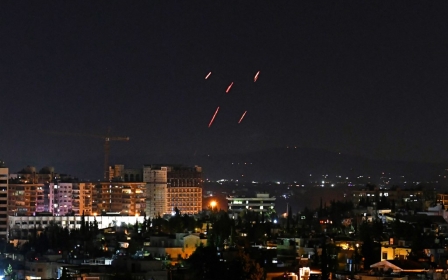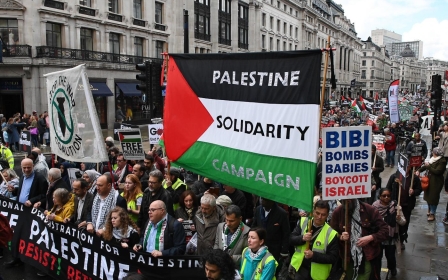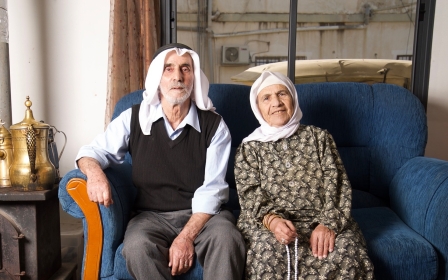Israel moves to re-establish illegal settlement of Homesh

Israeli settlers on Monday relocated a Jewish religious school originally established on private Palestinian land in the illegal outpost of Homesh to nearby state-owned land.
Settlers have long campaigned for a yeshiva to be established in the area, and the latest move is part of an incremental effort by the government to legalise the Homesh settlement, built deep inside the occupied West Bank.
Earlier this year, Israeli lawmakers approved a controversial piece of legislation that would allow four abandoned Jewish settlements in the West Bank - Homesh, Sa-Nur, Ganim and Kadim - to be re-established after they were dismantled in 2005.
Monday's steps to tentatively re-establish the settlement was made with the approval of Defence Minister Yoav Gallant, and was given the green light by Prime Minister Benjamin Netanyahu.
The Israeli military is allowing settlers to enter and exit Homesh freely, but journalists have been blocked from reporting on the construction efforts, according to Haaretz
New MEE newsletter: Jerusalem Dispatch
Sign up to get the latest insights and analysis on Israel-Palestine, alongside Turkey Unpacked and other MEE newsletters
The government is working on rolling back elements of then-prime minister Ariel Sharon's plan for disengagement from Gaza, which saw the four Israeli settlements in the West Bank also evacuated.
The attorney general's West Bank office has opposed the relocation of the school and reiterated that the move to re-establish the Homesh settlement was illegal.
The government ordered the military to no longer prevent settlers from entering Homesh and to provide security. The military, however, decided not to assist in constructing the new outpost until its legality is clarified.
Military officials speaking anonymously to Haaretz expressed frustration with the government's conduct, given that its instructions have been increasingly difficult to justify, even within Israeli law.
The Shomron Regional Council, which includes Homesh, has obtained permission from Israel's governing body in the West Bank, the Civil Administration, to plan construction work but it was not granted permission to start building.
"This is a holiday. An important day in the history of the state of Israel. A day when historical justice was done for one of the greatest injustices in this country to the Land of Israel and to Israeli citizens," Yossi Dagan, Shomron Regional Council chairman, said during a visit to the site of the yeshiva in Homesh.
'Reward to serious criminals'
The Yesh Din organisation, which provides legal advice to Palestinian landowners, said following the decision that "instead of evacuating the outpost immediately, Israel is giving a reward to serious criminals".
According to Yesh Din, the new location of the yeshiva "still doesn't allow Palestinians to reach their land and [further] continues their dispossession".
The right-wing National Security Minister Itamar Ben Gvir, whose party co-authored the bill, welcomed the move, describing it as a "historic moment".
The legislation is one of a series actions by Netanyahu's far-right government that have dealt a blow to Palestinian hopes for statehood and is likely to raise tensions that are already at a boiling point.
Netanyahu's government is dominated by settler leaders and allies who seek to promote settlement activity in occupied Palestinian territory. Now Israeli settlers can potentially re-establish the four illegal settlements.
The settlement of Homesh is one of the most politically charged and symbolic hilltops in the West Bank.
In recent years it has become a cause celebre amongst settlers seeking to establish Jewish supremacy over the whole West Bank territory.
For many settlers, it is also a means of establishing their religious arguments that no part of the land shall be off limits, as well as fulfilling a decades-long idea of grabbing as many hilltops as possible in a bid to establish "facts on the ground".
Despite not being allowed to establish a permanent presence in Homesh, settlers, often guarded by Israeli soldiers, have regularly flaunted their presence on the hilltop.
Whether establishing tents, religious schools and even parties on religious holidays, their presence has symbolised a vivid display of power and force that they will not allow politicians to give any concessions on settlements.
Middle East Eye delivers independent and unrivalled coverage and analysis of the Middle East, North Africa and beyond. To learn more about republishing this content and the associated fees, please fill out this form. More about MEE can be found here.





